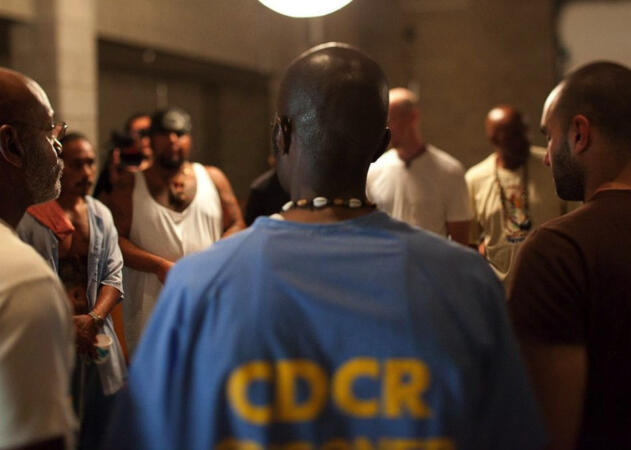
Films set in prisons often center around stories of redemption, broken paths, journeys to freedom or the day-to-day movements of those who must now live their lives behind bars. It seems astounding to consider, but the mental, emotional and psychological statuses of those who are carrying out lengthy sentences particularly for violent offenses are often overlooked. Imprisoned men and women are seen as being without redemption; labeled as damaged goods for involving themselves in the things that have led them to jail in the first place.
In his directorial debut, Jairus McLeary shifts the lens away from the actual crimes and circumstances that have led men to prison and instead looks at the psychological turmoil that is keeping them in mental chains within jailhouse walls. “The Work” follows a group of men; prisoners who are serving time within Northern California’s maximum security Folsom Prison, and everyday men who journey into the prison to discover what’s ailing them as they move about freely in the outside world. The program, which is run by inmates and ex-convicts of the Inside Circle Foundation, funds and facilitates the retreat. Extending over the course of four days, prisoners leave the politics of prison life (and correctional officers) at the door, engaging in intense group therapy with one another in an attempt to find the source of their pain.
As the film opens, we meet the outsiders who will be joining the prisoners in this revealing process. Charles a bartender, Brian, a teacher’s assistant and Chris, a museum associate, all show up in search of something that either shakes them out of their state of complacency or gives them clarity. With no true narrative in place, “The Work” seeks to follow the men along with their incarcerated brethren on their four-day journey to find some peace and understanding about themselves and their circumstances.
Day one of the program opens with the CEO, an older man named James issuing a call and response to the diverse group of men standing in a circle around him. The powerful baritone of all the men together sets the tone for the duration of the film. And yet, witnessing the group sessions often felt voyeuristic to me, as if I was watching something I was not supposed to see. The men’s personal stories seemed sacred, and I felt as though I was intruding on the process. It didn’t help either that as men repeatedly stripped themselves bare, Brian, one of the outside men seemed to scoff at them, projecting his elitist judgments and ideals on the very people who were attempting to share their space with him. His antagonizing behavior constantly pulled me outside of the film, forcing me to question his motivations.
Perhaps it’s my own ideas about therapy being a personal and very cherished experience or my ingrained notions about masculinity that I am always battling, but the painful raging and the tenderness of the group kept me ill at ease. As I witnessed the vulnerability of these men, I often wanted to turn my head away from the screen. These sequences were almost too much and too raw to be captured on film. All of the men (even Brian who albeit begrudgingly takes his own significant journey) have stories to tell, whether it was one of an absentee father, a father who taught them all the wrong things, a confidant that betrayed them, belittled them, or ignored him altogether. However, it was Dante’s story that moved me most.
We meet Dante on day three of the workshop. A Bloods gang member serving double life sentences with an additional fifty-five years, Dante speaks of trying to change his behavior and bond with his son from the inside. However, his child’s mother has stopped bringing the boy to visit. Obviously, the mother of Dante’s child must make the best choices that she can for the well-being of her son, after all, it was Dante’s heinous actions that led him to where he is. Still, watching the man break down and crumble at the prospect of losing all connections to his child was both agonizing and humbling.
By the final day of the session, many of the men are weary but lighter, and to witness these hyper-masculine towering men, weep and come to grips with their past and present circumstances was a profound experience, one I dare say I was unprepared for. Without any real set up, or taking heads continually framing the narrative, “The Work” allows these men to use their voices, listen to one another, and to find some compassion for those they may have dismissed previously. McLeary forces his audience, however difficult it may be, to do the same.
“The Work” premiered at SXSW Saturday, March 11th.
Aramide A Tinubu has her Master’s in Film Studies from Columbia University. She wrote her thesis on Black Girlhood and Parental Loss in Contemporary Black American Cinema. She’s a cinephile, bookworm, blogger, and NYU + Columbia University alum. You can read her blog at: www.chocolategirlinthecity.com or tweet her @midnightrami
